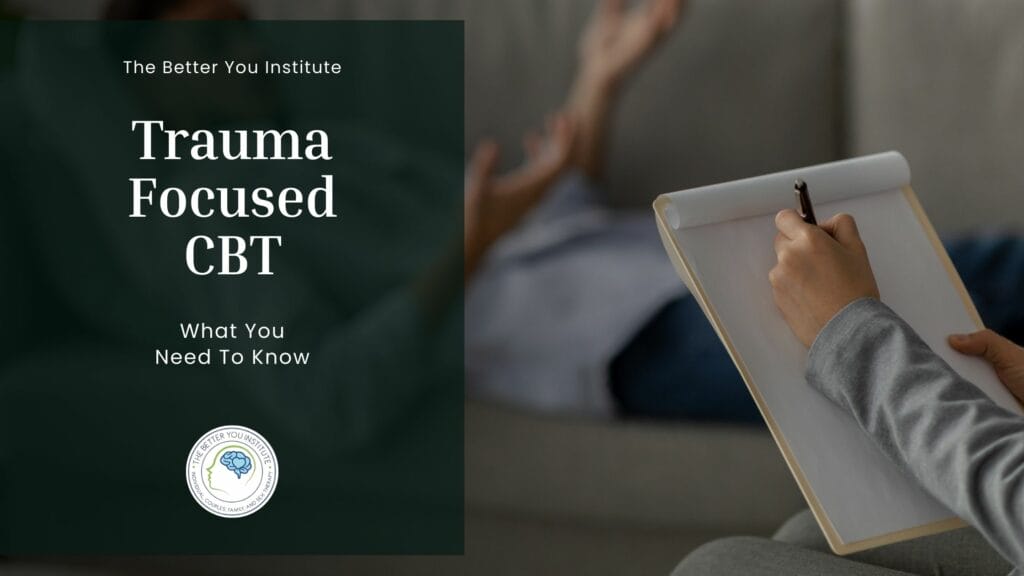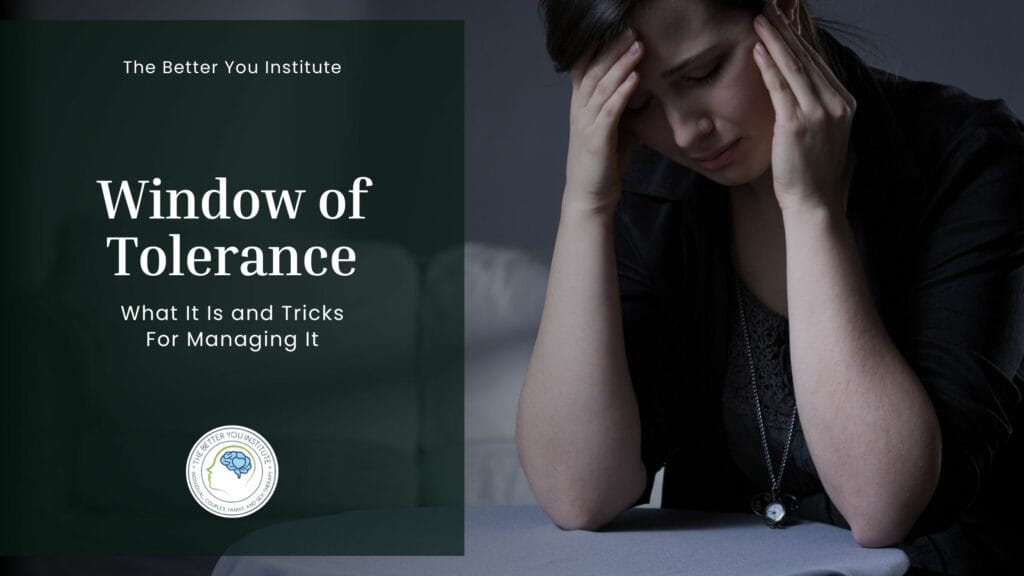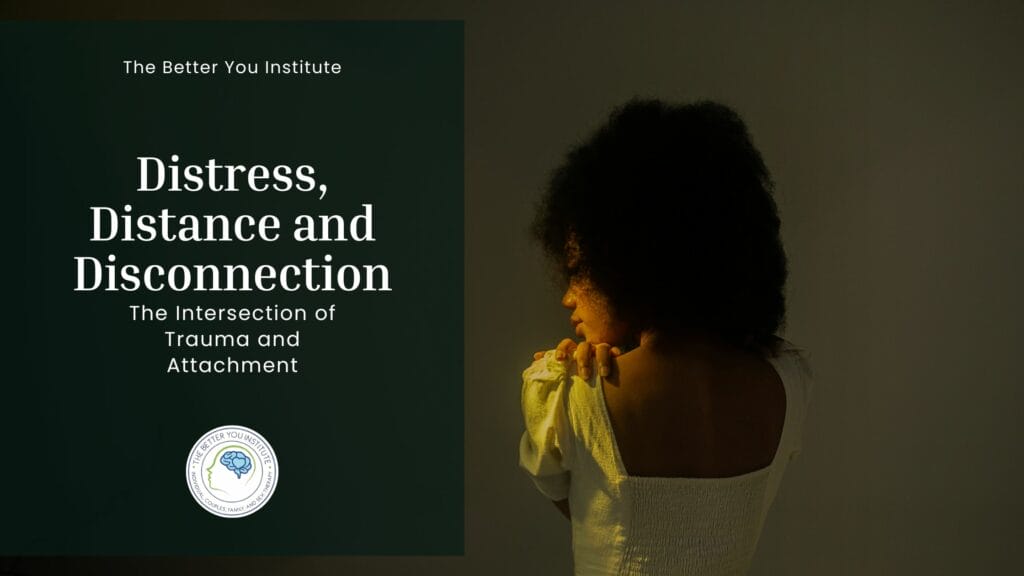Trauma focused cognitive behavioral therapy (TF-CBT) is used to treat childhood trauma. Trauma-focused cognitive behavioral therapy helps people between 3 and 21-years-old who are experiencing significant difficulties related to traumatic life events. Trauma happens when an experience disrupts a person’s sense of safety and their ability to cope. Childhood trauma comes in all shapes and sizes. Some childhood traumas that young people experience include significant loss, medical injury or illness, bullying, or sexual, emotional, or physical abuse. A child can also experience trauma by witnessing someone else’s trauma, such as domestic violence or witnessing a car accident.
Childhood is a vulnerable time, but trauma during this stage of life can be especially devastating. The experience of childhood trauma is unique, but trauma-focused cognitive behavioral therapy is one of the most effective ways to help children and their families recover. Many studies have proven trauma-focused cognitive behavioral therapy to work effectively. Trauma-focused cognitive behavioral therapy is an approach to helping children and their families overcome trauma by learning to manage the emotional, mental, and behavioral effects of trauma. Being informed in trauma-focused cognitive behavioral therapy will allow you to decide if this is the best treatment for you or your child.
Table of Contents
Who needs Trauma-Focused Cognitive Behavioral Therapy (TF CBT)?
For some people, the impact after a devastating experience can feel far worse than the experience itself. Childhood trauma is a parent’s worst nightmare. The impact of childhood trauma impacts the child, the parents, and the family. Sometimes the changes are immediate, and sometimes a young person begins to feel, act, and think differently much later on in life. TF-CBT is most effective for young adults, adolescents, and children. Other trauma therapies such as EMDR may be helpful if you are an adult or if TF-CBT does not sound like the right fit for you.
How to recognize trauma and the need for TF-CBT?

Experts define trauma as an experience where a person feels they had no control, where someone or something threatens the emotional or physical safety of themselves or someone they love, and where they experience changes that limit their ability to cope. People may experience different changes depending on their age. A young person might have nightmares, wet the bed, or have strong reactions to things that remind them about what happened. They might have changed from being a happy-go-lucky child to being sad all the time, having angry outbursts, fight more with siblings or school friends, or withdrawal. They might seem numb and unaffected and try to avoid everything that has to do with what happened to them. These changes might lead to school problems or problems at home.
What to expect as a parent or guardian?
Parents may have a difficult time trying to help their children. Even if a child wants to express themselves, they may not always know how to communicate what has happened or how they feel. Parents often feel lost and wish that their children could tell them exactly what they need from them. Parents sometimes even experience secondary trauma when they learn what happened to their child.
Some parents feel guilty that the trauma happened. They question how something like this could have happened without them knowing. Anxiety overcomes some parents’ thinking that the trauma will happen again. The behavioral difficulties that stem from childhood trauma may get frustrating to address for both the parent and the child. Finding the balance between what is normal child activity and what is trauma-induced can be difficult. You may start to question the idea of setting boundaries, having structure, and using discipline if you are worried that these things are too harsh on your child after trauma occurs. It’s not always easy to know how to balance between being compassionate and understanding and knowing when to give more structure and stability. Trauma-focused cognitive behavioral therapy can help empower a parent or caregiver relieving stress around their child’s trauma. Trauma-focused cognitive behavioral therapy can also help the child learn how to cope with the trauma they experienced.
Where did Trauma-Forced Cognitive Behavioral Therapy start?
 TF-CBT was first developed in the 1990s by three doctors who specialize in mental health: Judith Cohen, Esther Deblinger, and Anthony Mannarino. Their original goal was to serve children who had experienced sexual abuse. As time continued, other therapists learned that this approach worked for other traumas too. They added more techniques to the approach. And since then TF-CBT has expanded to include services for young people who have experienced multiple types of trauma. TF-CBT is now used to help single or repeated experiences of sexual, physical, or mental abuse, neglect, bullying, traumatic loss of a loved one, exposure to violence in the home or community, family separations, medical traumas, and many other types of traumatic events. It has been researched and shown to be effective with a variety of ages, including children as young as 3 years old, and young adults as old as 21-years-old.
TF-CBT was first developed in the 1990s by three doctors who specialize in mental health: Judith Cohen, Esther Deblinger, and Anthony Mannarino. Their original goal was to serve children who had experienced sexual abuse. As time continued, other therapists learned that this approach worked for other traumas too. They added more techniques to the approach. And since then TF-CBT has expanded to include services for young people who have experienced multiple types of trauma. TF-CBT is now used to help single or repeated experiences of sexual, physical, or mental abuse, neglect, bullying, traumatic loss of a loved one, exposure to violence in the home or community, family separations, medical traumas, and many other types of traumatic events. It has been researched and shown to be effective with a variety of ages, including children as young as 3 years old, and young adults as old as 21-years-old.
What type of therapy is Trauma-Forced Cognitive Behavioral Therapy?
 TF-CBT addresses the specific emotional, mental, and behavioral health needs of children and their families following a traumatic experience. The approach is also easily adapted to work for children at specific ages. TF-CBT includes cognitive-behavioral therapy (CBT). CBT focuses on how thinking affects behavior. TF-CBT is a combination of different therapy techniques to address the different changes that occur.
TF-CBT addresses the specific emotional, mental, and behavioral health needs of children and their families following a traumatic experience. The approach is also easily adapted to work for children at specific ages. TF-CBT includes cognitive-behavioral therapy (CBT). CBT focuses on how thinking affects behavior. TF-CBT is a combination of different therapy techniques to address the different changes that occur.
- A trauma-focused perspective recognizes the unique impact of post-traumatic stress on multiple areas of a person’s life. When in session, the therapist is knowledgeable of post-traumatic stress symptoms, and the way stress affects the brain, body, thoughts, and emotions. Therapists create safety for the clients by using different techniques like relaxed breathing and guided imagery. Safety allows the client to discuss their trauma in more depth.
- Cognitive-behavioral interventions help clients to start recognizing the connection between their thoughts, feelings, and actions using their day-to-day experiences. Sometimes there are also activities to do at home like monitor your thoughts and then come back to the next session to talk about them.
- Behavioral management principles help parents learn ways to increase acceptable behaviors and decrease unacceptable behaviors. For example, parents learn the motivation behind their children’s behavior to feel empowered to know which behaviors to ignore, which behaviors to reward, and when to give consequences.
- A family systems approach recognizes that a is impacted by their relationships with others as often as they impact others. This is why the approach includes other family members as often as possible, to help the whole family heal.
- A strengths-based, person-centered, and recovery-driven model aligns with a popular movement in mental health. This approach focuses on empowering individuals and their families, using strengths that they already have. It is also uniquely tailored to the specific needs and barriers of each family. And the approach helps people return to either a previous or higher level of functioning.
Learn more about what to expect from trauma focused therapy.
How long does Trauma-Forced Cognitive Behavioral Therapy last?
 TF-CBT is a short-term treatment that generally lasts anywhere between 12-24 sessions, depending on the nature of the trauma and who is involved in the treatment. Sessions are weekly and range from one to one and one-half hour sessions. Therapists have implemented this approach in outpatient mental health therapy offices, group homes, community centers, in-patient hospitals, schools, and in-home settings. Over 80% of children who receive TF-CBT experience significant improvement after about 8-weeks of trauma therapy treatment.
TF-CBT is a short-term treatment that generally lasts anywhere between 12-24 sessions, depending on the nature of the trauma and who is involved in the treatment. Sessions are weekly and range from one to one and one-half hour sessions. Therapists have implemented this approach in outpatient mental health therapy offices, group homes, community centers, in-patient hospitals, schools, and in-home settings. Over 80% of children who receive TF-CBT experience significant improvement after about 8-weeks of trauma therapy treatment.
What now?
While childhood trauma may feel like a nightmare has come true in your family, trauma-focused cognitive behavioral therapy can be the comforting glow of light that gets your family through the difficult nights.
Once you recognize that you or your child is experiencing trauma, deciding which therapy approach will work for your family can be a tough choice.
Now that you have some information about trauma and trauma-focused cognitive behavioral therapy, you may have more questions. You can read more about what to expect from this type of therapy here. If you are ready to explore this therapy approach further, you can call The Better You Institute and make an appointment at 267-495-4951 with one of our trauma specialist therapists, or visit our page on individual trauma therapy. We also offer online trauma therapy for those who do not live in the Philadelphia area







